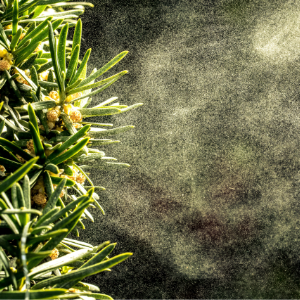- Manage Your Health with Our HealthBites
- Flu Shot: Register for Flu Vaccination
- Are My Symptoms From The Common Cold, The Flu or COVID-19?
- Vaccination
- COVID-19 Vaccines in Pharmacies
- Seasonal Allergies: Symptoms, Prevention, Diagnosis and Treatment
- Naloxone’s Role In Opioid Overdose Prevention
- Dispose of Medications Safely
- Quit Smoking with the Help of Your Pharmacist
- Minor Ailments
- Pharmacy Health Clinics
Seasonal Allergies: Symptoms, Prevention, Diagnosis and Treatment

What is a seasonal allergy?
An allergy is the body’s immune systems reaction to environmental elements known as “allergens”1. Allergens are considered foreign agents to your body – so when an allergen comes into contact with your body, the body produces an immune response2 as it sees the allergen as a threat. As a result of the immune response, you may feel symptoms such as sneezing, itching, and watery eyes1. Seasonal allergies occur when a specific allergen (e.g. ragweed, grass or tree pollen) is produced, typical to the season in question.
Pollen is a common cause of seasonal allergies. People are often allergic to pollen that originates from plants pollenated by the wind. Most of the pollen that acts as an allergen comes from grass, trees and weeds. The pollen from these plants is emitted at different times of the year so you will experience these allergy symptoms depending on when the allergen you are allergic to is active.
In spring, the pollen that causes allergies usually comes from trees such as oak, elm or beech. In summer, grass and weeds are often the culprit for seasonal allergies. During fall, ragweed is the main cause of pollen allergies3.
Another allergen that causes seasonal allergies is mold spores. These spores can be airborne during spring, summer and fall3.

What are symptoms of a seasonal allergy?
Seasonal allergies typically cause symptoms which may include runny nose, nasal congestion, itchy skin, sneezing, watery eyes and itchy eyes or ears. In rare circumstances, people may experience shortness of breath, wheezing and coughing. Some people who have seasonal allergies also have asthma. These individuals need to be aware that seasonal allergens could potentially worsen their asthma.
How do you prevent a seasonal allergy?
Seasonal allergies are best prevented by avoiding the allergen. For example, if you are allergic to pollen, know that pollen counts peak in the morning and early afternoon2 and are also higher on dry windy days. One simple remedy is to stay inside and avoid pollen exposure by keeping your windows and doors closed and turning on the air conditioning to filter outside air. You can also avoid pollen by minimizing outdoor activities, such as cutting the grass, which circulates pollen in the air, or by wearing a facemask.
How to diagnose seasonal allergies?
When visiting your doctor, make sure to advise them of your symptoms, when they occur and the suspected allergen. The visit may result in a clinical diagnosis from your doctor that you have an allergy based on the information provided. However, in some circumstances, doctors will want to diagnose a seasonal allergy with a skin test or an allergen-specific immunoglobulin test. With a skin test, typically a small amount of the suspected allergen is placed on a person’s skin and pricked with a needle3. After the skin test the doctor will wait to see if the person develops a wheal (bump) and flare (redness) as a response. An allergen-specific immunoglobulin (IgE) test (where blood is withdrawn and tested) can also be conducted to help diagnose an allergy3.
How to treat seasonal allergies?
Seasonal allergies are commonly treated with over-the-counter (OTC) oral antihistamines. Other OTC remedies include artificial tears and antihistamine eye drops, a saline solution nasal rinse, corticosteroid nasal sprays and decongestants to help relieve symptoms. Ask your pharmacist for a recommendation on what is right for you. Your doctor may also prescribe certain medications, including antihistamines, eye drops or nose sprays to manage more difficult symptoms. In severe circumstances, seasonal allergies can be treated with allergy shots – a form of immunotherapy. Allergy shots work by exposing you to small amounts of an allergen, over time, to gradually build tolerance to the allergen causing your allergy.
- Citations:
- Asthma Canada. Allergies and Asthma. Retrieved 22 April 2021, from https://asthma.ca/get-help/allergies-and-asthma/
- Canadian Association of Optometrists. Seasonal Allergies. Retrieved 22 April 2021, from https://opto.ca/health-library/seasonal-allergies
- Merck Manual. Seasonal Allergies. Retrieved 22 April 2021, from https://www.merckmanuals.com/en-ca/home/immune-disorders/allergic-reactions-and-other-hypersensitivity-disorders/seasonal-allergies
The information in this resource is for general information purposes only and is not intended to replace informed medical advice. Metro Ontario Pharmacies Limited assumes no legal liability for the accuracy, completeness or usefulness of the information contained herein.










